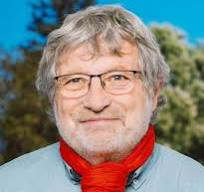Scientific Program
Lausanne CHUV
Auditoire César Roux
Friday June 21 2024
Morning
8:30
Welcome and Introduction
by Bernard Rossier (Université de Lausanne)
Welcome from the Dean
by Manuel Pascual (Faculté de Biologie et de Médecine, Université de Lausanne)
Who was Jean-Pierre Guignard?
by Jean-Daniel Tissot (Université de Lausanne)
8:55
State of the Art Lecture (1)
Chair: François Verrey (UZH) and Laurent Schild (UNIL)
Functional imaging of the kidney and drug toxicity
Andrew Hall (University of Zürich)

Andrew Hall is associate professor ad personam at the Institute of Anatomy, holding a double affiliation with the Medical and Science Faculties. The activities of his research group are focused on the development and application of advanced imaging approaches, including intravital microscopy, to elucidate dynamic cellular mechanisms of kidney diseases, with the long-term goal of developing new diagnostic and therapeutic strategies. He receives funding from the Swiss National Science Foundation.
Since 2022 Andrew Hall is the founding director of the Zurich Kidney Center, a Competence Center of the University of Zurich, which brings together scientists and clinicians across different institutions, working together to find new ways to diagnose and treat kidney diseases.
Integration of high-throughput imaging and multiparametric metabolic profiling reveals a mitochondrial mechanism of Tenofovir toxicity
Pearson A, Haenni D, Bouitbir J, Hunt M, Payne BAI, Sachdeva A, Hung RKY, Post FR, Connolly J, Nlandu-Khodo S, Jankovic N, Bugarski M, Hall AM. Function (Oxf.) (2023)
https://pubmed.ncbi.nlm.nih.gov/36654930/
Spatiotemporal organisation of protein processing in the kidney
Polesel M, Kaminska M, Haenni D, Bugarski M, Schuh C, Jankovic N, Kaech A, Mateos JM, Berquez M, Hall AM. Nat Commun. (2022)
https://pubmed.ncbi.nlm.nih.gov/36175561/
Intravital kidney microscopy: Entering a new era
Martins JR, Haenni D, Bugarski M, Polesel M, Schuh C, Hall AM Kidney Int. (2021)
https://pubmed.ncbi.nlm.nih.gov/34015315/
09:30 Session 1 → Pediatric Nephrology
Chair: Philippe Jaeger (UCL)
9:30
Complement in health and disease – a question of moderation
Christoph Licht (Univerity of Toronto)

Dr. Christoph Licht’s contributions to Paediatric Nephrology have evolved at The Hospital for Sick Children (SickKids) over the past 17 years to his current clinical, research, and academic appointments of Staff Nephrologist and Medical Director of Dialysis & Apheresis Program in the Division of Nephrology; Senior Scientist in the SickKids Research Institute Cell Biology Program; Professor at the University of Toronto in the Departments of Paediatrics, IMS, LMP, and Medicine; and Associate Staff Physician in Medicine at UHN Toronto General Hospital. In addition, Christoph is a Guest Professor at the University of Ghent, Belgium.
He completed a Doctor of Medicine (MD) at the Albert-Ludwigs-University, Freiburg, Germany, in 1992 and a Doctorate in Medicine (Dr. med) in Internal Medicine/Nephrology at the Ruprecht-Karls-University, Heidelberg, Germany, in 1995. In parallel, he completed his postgraduate training in Paediatrics (1992-1998) and Paediatric Nephrology (1998-1999; 2002-2005) at the Children’s Hospital of the University of Cologne, Germany.
From 1999-2002, Dr. Licht relocated to the USA for a postdoctoral research fellowship in Nephrology at the University of Texas, Southwestern Medical Center in Dallas, Texas. He returned to the Children’s Hospital of the University of Cologne, Germany, where he completed his “Habilitation” in 2005. In 2006, he relocated to Canada to commence his full-time position as Staff Nephrologist in the SickKids Division of Nephrology and as Assistant Professor of Paediatrics at the University of Toronto.
Dr. Licht is an international expert on complement-mediated kidney diseases. His work has advanced the understanding of the pathogenesis and management of aHUS and C3G. His laboratory has made significant contributions to the knowledge of the consequences of complement activation on platelets, neutrophils and endothelial/epithelial cells, and has established a series of functional assays allowing for the assessment of patients with (suspected) complement-mediated diseases. In current research projects the Licht lab explores the role of complement in tissue homeostasis beyond the kidneys, and of intracellular complement.
Dr. Licht established and is Co-director of the University of Toronto “Complement Fellowship” and launched the annual international “Toronto Complement Conference”.
Dr. Licht also has a long-standing interest in chronic proteinuric kidney disease (such as in Alport Syndrome). He established one of the first registries of children with Alport Syndrome. He demonstrated the treatment benefit of RAAS blockade in this cohort. He published international treatment guidelines for children with Alport Syndrome. He also demonstrated a central role for ET-1/ETBR as well as complement in the progression of chronic proteinuric kidney disease.
As Medical Director of Medical Director of the SickKids Dialysis & Apheresis Program, Dr. Licht lead the implementation of Hemodiafiltration as the new treatment standard for patients on hemodialysis, and the use of Continuous Flow Peritoneal Dialysis (CFPD) for the treatment of very small newborns with kidney failure.
Dr. Licht has authored over 145 peer-reviewed publications and multiple book chapters. His efforts have supported millions of dollars in research funding.
10:00
Clinical and molecular aspects of inherited hypomagnesemia
Martin Konrad (Münster Universität)

Prof. Konrad’s working group has represented a scientific focus on hereditary tubular kidney diseases for many years, combining clinical, genetic and physiological research activities. The members of the working group succeeded in identifying several genetic defects (TRPM6, digenic CLCNKA/B mutations, CLDN19, KLHL3, CYP24A1) and in establishing clearly definable genotype-phenotype correlations.
Between 1996 and 2000 these studies were carried out by the European Consortium for Bartter Syndrome. Prof. Konrad’s working group oversees the world’s largest patient collective for Barrter syndrome (> 500 patients), which represents an optimal basis for further successful scientific projects.
10:30 – 11:00 Coffee break
Afternoon
11:00 Session 2→ Rare diseases
Chair: Bruno Vogt (University of Bern, Switzerland)
11:00
The continuing puzzle of congenital salt-losing tubulopathies
Mario Bianchetti (Universita della Svizzera Italiana)
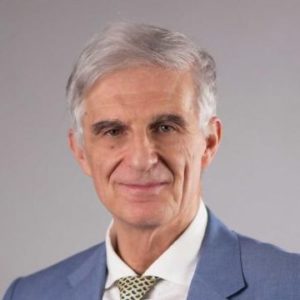
Prof. em. Dr. med. Mario Bianchetti (1949), former Dean of the Faculty of Biomedical Sciences, was Head of Pediatrics at the Regional Hospital of Bellinzona and Valli and Director of the Department of Paediatrics of the Italian Switzerland. He graduated from the University of Bern and then specialised first in paediatrics and nephrology.
His research activity focuses on renal metabolism of pH, magnesium and potassium, leucocytoclastic vasculitis, pharmacological treatment of urinary tract infections, genesis and treatment and arterial hypertension, rare side effects of pharmacotherapy, vitamin D metabolism and its replacement. Finally, he is interested in the symptomatic treatment of fever.
Mario Bianchetti was nominated PD by the University of Bern in 1992 and associate professor in 1998. Mario Bianchetti has been Dean of the Faculty of Biomedical Sciences at USI since 2015.
11:30
Primary hyperoxaluria
Pierre Cochat (Université de Lyon)

Emeritus Professor of Pediatrics – University Claude Bernard University, Lyon
National Authority for Health (Haute Autorité de santé) : Member of the governance, President of the Transparency Committee, Vice-president of the Vaccination Committee
Member of the Académie Nationale de Médecine (membre correspondant, 1ère division)
PAST POSITIONS
University
Professor of Pediatrics – Claude Bernard University, Lyon (1994-2021)
Dean – Laennec Medical School, Claude Bernard University, Lyon (2006-2009)
President – Comité de coordination des études médicales, Claude Bernard University, Lyon (2016-2020)
Hospital
Chair – Pediatric Nephrology Rheumatology and Dermatology Dept, Hôpital Femme Mere Enfant, Lyon (2005-2019)
Coordinator – Reference Centre for Rare Renal Diseases Néphrogones, Lyon (2004-2020)
Coordinator – Pediatric kidney transplantation program, Lyon (1994-2020)
Chair – Department of Pediatrics and Pediatric Surgery, Hospices Civils de Lyon (2009-2016)
Scientific societies
President – Société de néphrologie pédiatrique (2000-2003)
Secretary General – European Society for Pediatric Nephrology (2008-2012)
President – International Pediatric Nephrology Association (2013-2019)
University MENTORING
Supervisor of 74 Clinical Research Fellows
Supervisor of 26 PhD
Teaching in Foreign Countries
Algeria, Brazil, Cameroon, China, Croatia, Egypt, Haiti, India, Italy, Ivory Coast, Lebanon, Lithuania, Madagascar, Morocco, Nepal, Paraguay, Poland, Portugal, Russia, Serbia, Singapore, Slovakia, South Africa, Tunisia, United States of America, Vietnam.
MAIN FIELDS OF INVESTIGATION
Inherited renal diseases (primary hyperoxaluria, cystinosis), Pediatric kidney transplantation, Pharmacology
Publications: 486 on PubMed, of which 335 in international peer-reviewed journals (H index 57)
Textbooks: author of 132 chapters – editor/co-editor of 11 textbooks
Invited lectures: 533
Communications at scientific meetings: 739
President/organiser of scientific meetings: 29
12:00 – 13:30 Lunch
13:30 Session 3→ Kidney Development and Rare Diseases
Chair: Olivier Bonny (Université de Fribourg)
13:30
From Renal Disease Gene Discovery to Personalized Medicine
Friedhelm Hildebrandt (Boston)

Dr. Hildebrandt is the William E. Harmon Professor at Harvard Medical School, and chief of the Division of Nephrology at Boston Children’s Hospital.
His research work is concerned with the identification and functional characterization of single-gene causes of chronic diseases of the kidney, the eye and the auditory system in children. His group has developed high-throughput sequencing approaches, identified 80 novel disease genes, of the currently 240 known monogenic causes of chronic kidney disease.
When studying the function of these newly identified disease genes in models of mice, zebrafish and drosophila, as well as in cell-based systems they discovered multiple novel pathogenic mechanisms of kidney disease. For instance, his lab discovered that DNA damage repair plays a role in the pathogenesis of organ fibrosis (Chaki et al. Cell 150:533-48, 2012; Zhou et al., Nat Genet 44:910-15; editorial p. 836-8).
Dr. Hildebrandt’s work interphases with 200 nephrologists and 10,000 patient families worldwide. The research work of his lab has been supported by grants from the NIH, a grant as a Doris Duke Distinguished Clinical Scientist, the March of Dimes, and the Thrasher Research Foundation.His work has been published in over 380 original publications.
Dr. Hildebrandt is a member of the National Academy of Medicine (NAM/IOM) USA, of the German National Academy of Science, and he is an alumnus Investigator of the Howard Hughes Medical Institute (HHMI).
He received the Homer Smith Award for Research in Nephrology (ASN), the Alfred N. Richards Award (ISN), as well as the Mead E. Johnson Award for Pediatric Research from the Pediatric Research Societies. He has trained over 100 clinician scientists.
Patrick Niaudet is Emeritus Professor of Pediatrics at the University Paris-Descartes. He was head of the Pediatric Nephrology unit at the Necker-Enfants Malades Hospital in Paris, France (1999- 2011). After he graduated from medical school in Paris, he trained in basic immunology in Paris and in London at the Imperial Cancer Research Fund and in Pediatric Nephrology with Pierre Royer and Michel Broyer. He worked in the French medical research institute INSERM for several years with Renée Habib. In 1985, he became Michel Broyer’s assistant, a well-known pediatric nephrologist at the Necker-Enfants Malades hospital. Patrick Niaudet has worked in close collaboration with Corinne Antignac on the genes implicated in several inherited renal diseases, including nephrotic syndrome. Patrick Niaudet has published over 330 peer-reviewed scientific articles, over 70 reviews and book chapters.
Patrick Niaudet has been President of the ethical committee of the French Biomedicine Agency during 6 years (2012-2018). Since 2019, he is a member of the commettee for the evaluation of medicinal products at the Haute Autorité de Santé.
Patrick Niaudet has been co-editor of three editions of the Pediatric Nephrology textbook, officially endorsed by IPNA.
Patrick Niaudet has served as Assistant Secretary of the European Society of Pediatric Nephrology (ESPN) (1989–1992) and Secretary General of the ESPN (1992-1997). He became a member of the International Pediatric Nephrology Association (IPNA) council in 1986 and served as Assistant Secretary of IPNA from 1992 to 1997. He was then Chairman du Continuous Medical Education Committee of IPNA until 2004. In 2016, together with Jean-Pierre Guignard, he received the Ira Greifer Award from IPNA.
Patrick Niaudet has been involved in several continuous medical education programs in Africa, Asia, Eastern Europe and Latin America. From 1995 to 2014, he was involved in a two-week annual teaching course in Vietnam. He developed a dialysis transplantation program and performed the first pediatric renal transplantations from living donors in Vietnam.
14:00
Cystinosis: from childhood to adulthood
Patrick Niaudet (Hôpital Necker, Paris)
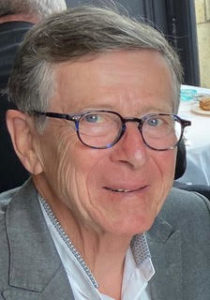
Patrick Niaudet is Emeritus Professor of Pediatrics at the University Paris-Descartes. He was head of the Pediatric Nephrology unit at the Necker-Enfants Malades Hospital in Paris, France (1999- 2011). After he graduated from medical school in Paris, he trained in basic immunology in Paris and in London at the Imperial Cancer Research Fund and in Pediatric Nephrology with Pierre Royer and Michel Broyer. He worked in the French medical research institute INSERM for several years with Renée Habib. In 1985, he became Michel Broyer’s assistant, a well-known pediatric nephrologist at the Necker-Enfants Malades hospital. Patrick Niaudet has worked in close collaboration with Corinne Antignac on the genes implicated in several inherited renal diseases, including nephrotic syndrome. Patrick Niaudet has published over 330 peer-reviewed scientific articles, over 70 reviews and book chapters.
Patrick Niaudet has been President of the ethical committee of the French Biomedicine Agency during 6 years (2012-2018). Since 2019, he is a member of the commettee for the evaluation of medicinal products at the Haute Autorité de Santé.
Patrick Niaudet has been co-editor of three editions of the Pediatric Nephrology textbook, officially endorsed by IPNA.
Patrick Niaudet has served as Assistant Secretary of the European Society of Pediatric Nephrology (ESPN) (1989–1992) and Secretary General of the ESPN (1992-1997). He became a member of the International Pediatric Nephrology Association (IPNA) council in 1986 and served as Assistant Secretary of IPNA from 1992 to 1997. He was then Chairman du Continuous Medical Education Committee of IPNA until 2004. In 2016, together with Jean-Pierre Guignard, he received the Ira Greifer Award from IPNA.
Patrick Niaudet has been involved in several continuous medical education programs in Africa, Asia, Eastern Europe and Latin America. From 1995 to 2014, he was involved in a two-week annual teaching course in Vietnam. He developed a dialysis transplantation program and performed the first pediatric renal transplantations from living donors in Vietnam.
14:30 – 14:35 Mini break
14:35
State of the Art Lecture (2)
Chair: Sophie de Seigneux (Université de Genève) et Bernard Rossier (Université de Lausanne)
The Evolutionary Basis of Progressive Kidney Disease
Robert Chevalier (University of Virginia)
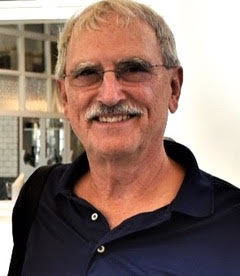
RLC2M@hscmail.mcc.virginia.edu
M.D. Professor Emeritus University of Virginia School of Medicine. Robert Chevalier was born in Chicago but was raised in Europe. He returned to the United States in 1962 and earned his BS in Zoology and MD degrees from the University of Chicago. He then completed pediatric residency and renal physiology fellowship at the University of North Carolina, Chapel Hill, and clinical pediatric nephrology fellowship at the University of Colorado. He spent the month of June, 1975, as a fellow with Jean-Pierre Guignard on the pediatric nephrology service at the CHUV, which started a close friendship that lasted nearly 50 years.
He joined the faculty of the University of Virginia in 1978, where he established the Division of Pediatric Nephrology. The Division grew steadily, with additional faculty and expanding clinical, research, and fellowship programs. In 1992 he returned to Lausanne for a sabbatical year in the laboratory of Bernard Rossier, the beginning of another long friendship. In 1997 he was appointed Chair of the Department of Pediatrics, a position he held until 2010, when he returned to his laboratory full-time.
He served as a member of the American Board of Pediatrics, Sub-board of Pediatric Nephrology, president of the American Society of Pediatric Nephrology, and councilor of the International Pediatric Nephrology Association. He continues to go back to his European roots, with frequent trips to Lausanne.
A large part of his scientific career was devoted to the study of congenital urinary tract obstruction which accounts for most cases of renal insufficiency in the infant. Using cell culture techniques and experimental animal models of unilateral ureteral obstruction (UUO) , he demonstrated that compared to the adult, the neonatal kidney is more susceptible to the injurious effects of ureteral obstruction. he developed models of chronic partial UUO in the neonatal rat and mouse , and found that obstruction leads to cellular apoptosis and necrosis at the glomerulotubular junction and formation of atubular glomeruli.
Recently his interests have shifted towards the evolutionary aspects of kidney development.He retired as Professor Emeritus in 2014 after 36 years on faculty at the University of Virginia, during which he was continuously funded by the National Institutes of Health. He is the author of over 200 research papers and chapters. In his retirement, he continues to participate in international meetings, including those sponsored by the International Society for Evolution, Medicine, and Public Health of which he is a lifetime member.
Chevalier, R. L. (2018). Evolution and Kidney Development: A Rosetta Stone for Nephrology. JOURNAL OF THE AMERICAN SOCIETY OF NEPHROLOGY, 29(3), 706-709. doi:10.1681/ASN.2018010013
Charlton, J. R., & Chevalier, R. L. (2018). Developmental Origins of CKD: Big Problems From Small Packages. AMERICAN JOURNAL OF KIDNEY DISEASES, 71(1), 3-5. doi:10.1053/j.ajkd.2017.08.022
15:10 – 15:40 Coffee break
15:40 Session 4 → Jean-Pierre Guignard, a pioneer in pediatric nephrology
Chair: jean-François Tolsa and Jean-Marie Matthieu
15:40
50 years of renal transplantation in Lausanne: a brief history and an update on current achievements
Hassib Chedade (Université de Lausanne)

M.D., PD & MER; Since 2008 – Head of the Pediatric Nephrology Unit and Laboratory at CHUV,
Assistant Physician (20%) for the Pediatric Nephrology Unit at HUG as part of the Vaud-Geneva collaboration
Areas of expertise
Glomerular filtration rate and assessment of renal function in children
Renal transplantation in children
Nephrotic syndrome in children
Genetic kidney diseases in children
Research activity
Assessment of graft renal function in children and adults: development of a unique and novel formula for estimating GFR
Etude de l’effet d’un traitement de Galactose sur une rechute d’un syndrome néphrotique idiopathique chez l’enfant
sFRP1 as a molecular diagnostic tool in renal diseases
Prognostic value of renal tissue oxygenation on renal disease progression in patients with hypertension and renal disease
Relation entre la protéinurie et l’excrétion du phosphate dans le syndrome néphrotique de l’enfant
Corrélation de la Cystatine C et du NGAL avec la clairance à l’inuline pour évaluer la fonction rénale des prématurés et des nouveau-né
Chronic Kidney Disease (CKD) and Glomerular filtration rate (GFR) determination in pediatric population: Sinistrin clearance measurement and GFR estimation
Unité de pédiatrie néphrologique,
Centre hospitalier universitaire vaudois
1011 Lausanne
hassib.chehade@chuv.ch
16:05
What sick newborns owe Jean-Pierre Guignard …
Jean-Bernard Gouyon (Université de la Réunion)

Emeritus Professor of Pediatrics –
Former Research Director of the Centre d’Études Périnatales de l’Océan Indien University de la Réunion, France
Former director of the Centre d’Études Périnatales de l’Océan Indien
jean-bernard.gouyon@univ-reunion.fr
02 62 52 89 00
Early optimal parenteral nutrition and metabolic acidosis in very preterm infants
Francesco Bonsante , Jean-Bernard Gouyon , Pierre-Yves Robillard , Béatrice Gouyon , Silvia Iacobelli PLoS ONE, 2017, 12 (11), ⟨10.1371/journal.pone.0186936⟩
Respiratory morbidity of preterm infants of less than 33 weeks gestation without bronchopulmonary dysplasia: a 12-month follow-up of the CASTOR study cohort.
B Fauroux , Jean-Bernard Gouyon , J-C Roze , C Guillermet-Fromentin , I Glorieux , et al.
Epidemiology and Infection, 2013, 142 (07), pp.1362 – 1374. ⟨10.1017/s0950268813001738⟩
A Population-Based Study of Meconium Aspiration Syndrome in Neonates Born between 37 and 43 Weeks of Gestation Cyril Fischer , C. Rybakowski , Cyril Ferdynus , P. Sagot , Jean-Bernard Gouyon International Journal of Pediatrics, 2012, 2012, pp.321545. ⟨10.1155/2012/321545⟩
Antibiotics Prescription Over Three Years in a French Benchmarking Network of 23 Level 3 Neonatal Wards Séverine Martin-Mons , Simon Lorrain , Silvia Iacobelli , Béatrice Gouyon , Jean-Bernard Gouyon Frontiers in Pharmacology, 2021, 11, pp.585018. ⟨10.3389/fphar.2020.585018⟩
16:30
From kidney to gut: an unusual trajectory and exciting updates in pediatric gastroenterology
Vera de Matos Maillard (University of Pennsylvania)
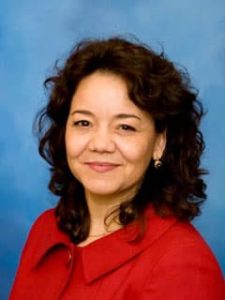
Vera De Matos Maillard, MD, Assistant Professor at the University of Pennsylvania and Attending Physician with the Division of Pediatric Gastroenterology at the Children’s Hospital of Philadelphia (CHOP).
Areas of Expertise: General Gastroenterology, Hepatology and Nutrition, Eosinophilic Esophagitis, Inflammatory Bowel Disease, Endoscopy, Quality improvement of medical care.
I am dedicated to maintaining a busy clinical activity in general gastroenterology with an interest in endoscopy, eosinophilic esophagitis, and inflammatory bowel disease. I am establishing an endoscopy teaching program for gastroenterology fellows at CHOP. My activities impact the care of many children with gastrointestinal and liver disorders and the training of 15 fellows every 3 years.
Prior to joining CHOP as a Clinical Assistant Professor in 2018, I trained in General Pediatrics in Switzerland and completed a Fellowship in Pediatric Gastroenterology at CHOP. I worked as an attending physician in Pediatric Gastroenterology at the University of Michigan, Mott Children’s Hospital, where I acquired a vast experience in Gastroenterology and Hepatology in both outpatient and inpatient settings. At Michigan, I co-directed a comprehensive eosinophilic esophagitis clinic and developed deep expertise in the care of children with this disorder. I also actively participated in clinical research on inflammatory bowel disease.
Subsequently, I worked as an attending physician at the Children’s Hospital of the University of Geneva, Switzerland, in the areas of Hepatology and Gastroenterology. Since joining CHOP in 2018, I have maintained a busy clinical practice in general Pediatric Gastroenterology, including a heavy emphasis on endoscopic procedures.
Publications
- Smith EA, Dillman JR, Adler J, De Matos Maillard V: MR Enterography of Extraluminal Manifestations of Inflammatory Bowel Disease in Children and Adolescents: Moving Beyond the Bowel Wall. AJR Am J Roentgenol 198(1): W38-45, Jan 2012.
- Dillman JR, Smith EA, Sanchez R, DiPietro MA, Fazeli Dehkordy S, Adler J, De Matos Maillard V, Khalatbari S, Davenport MS: Prospective cohort study of ultrasound; ultrasound and ultrasound; MR enterography agreement in the evaluation of pediatric small bowel Crohn disease. Pediatr Radiol 46(4): 490-7, Apr 2016.
- Dillman JR, Carlos RC, Smith EA, Davenport MS, De Matos Maillard V, Adler J: Relationship of Bowel MR Imaging to Health-related Quality of Life Measures in Newly Diagnosed Pediatric Small Bowel Crohn Disease. Radiology 280(2): 568-75, Aug 2016.
- Dillman JR, Dehkordy SF, Smith EA, DiPietro MA, Sanchez R, De Matos Maillard V, Adler J, Zhang B, Trout AT: Defining the ultrasound longitudinal history of newly diagnosed pediatric small bowel Crohn disease treated with infliximab and infliximab –azathioprine combination therapy. Pediatr Radiol 10.1007/s00247-017-3848-3, Apr 2017.
16:55 – 17:00 Minibreak
17:00
Is there a pilot in the plane?
Anita Truttmann (Université de Lausanne)
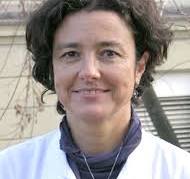
Médecin cheffe, Service de néonatologie
Prof. Associé, néonatalogie et pédiatrie, FBM UNIL Lausanne
Anita Truttmann’s clinical responsibilities concern both full-term and premature babies who present with multiple pathologies, including respiratory, cerebral or infectious types. Added to this are procedures introduced by the neonatologist: imaging protocols during brain lesions, hypothermia treatment during neonatal asphyxia, integrated electroencephalogram protocols according to continuous aEEG amplitude and long-term monitoring of the child born extremely premature in collaboration with the CHUV Development Unit.
Anita Truttmann’s line of research, conducted in collaboration with the Department of Fundamental Neurosciences as well as the Department of Radiology, is clearly defined in a translational orientation; it concerns brain development with imaging markers, as well as the marking of autophagy, a natural mechanism of neuronal degradation that is extremely activated in situations of cerebral asphyxia and can lead to neuronal death. Combining approaches using in vitro, animal models, MRI and autopsies, this work has been the subject of publications in prestigious scientific journals and has given rise to numerous thesis works, several of which have been distinguished by the FBM.
17:10
Early postnatal nutrition and renal consequences in very-low-birth weight infants
Silvia Iacobelli (CHU de la Réunion)
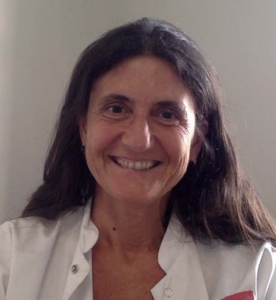
Silvia Iacobelli, Professeur des Universités – Praticien Hospitalier
Chef de Service Réanimation Néonatale et Pédiatrique, Néonatologie
CHU La Réunion – Site Sud (Saint Pierre), France
Email: Silvia Iacobelli
Dr Silvia Iacobelli is head of the NICU-PICU-Neonatology department at Reunion Island University Hospital (Saint Pierre, France) and coordinator of the paediatric resident’s educational training program (Indian Ocean). She is also director of research unit at the Centre d’Etudes Périnatales de l’Océan Indien (Reunion Island University, France).
Dr Iacobelli received her medical degree from the Bari School of Medicine in Italy. Subsequently, she completed paediatric residency at both Bari and Strasbourg Universities. In 2013, she earned a PhD in epidemiology and public health from the Burgundy University (France) and became full professor of paediatrics in 2017. Her principal domains of interest are electrolyte and kidney balance, in relationship with enteral and parenteral nutrition. She has published more than 90 manuscripts and has an h-index of 27, according to Web of Science. Additionally, she has authored or co-authored several book chapters on kidney pathophysiology and electrolyte balance in neonates.
17:35
Developmental programming of cardiovascular and renal disorders in a rat model of intrauterine growth restriction: involvement of endothelial progenitor cell dysfunction
Catherine Yzydorczyk (Université de Lausanne)
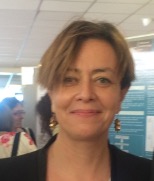
C.Yzydorczyk holds a PhD in biomedical sciences and life and health sciences from the Université de
Montréal (Canada) and the Université d’Auvergne (France). After two post-doctorates in Nancy and
Marseille (France), C.Yzydorczyk followed Pr Simeoni to Lausanne in 2014 as a research fellow to
develop a research laboratory focusing on the Developmental Origins of Health and Disease (DOHaD). In 2017, she was awarded an academic title of « Maitre d’Enseignement et de Recherche », which enables her to teach at the University of Lausanne at bachelor and master levels and to supervise master’s students in biology, medicine and MD students. Her research focuses mainly on the long-term consequences of intrauterine growth restriction. Thanks in particular to funding obtained from the “Association pour l’information et la recherche sur les maladies rénales génétiques” (AIRG). In 2017, she was able to identify a sexual dimorphism in the development of cardiovascular, metabolic and hepatic alterations associated with oxidative stress and premature cellular senescence at adulthood in a rat model born after an intrauterine growth restriction.
17:45 – 18:00 Break
18:00 Session 5 →Jean-Pierre Guignard, a citizen of the world
Chair: Bernard Rossier (University of Lausanne, Switzerland)
18:00
Merci! Camarade Guignard!
Bernard Borel (Médecins Action Santé Migrants et Centrale sanitaire)
Bernard B is a pediatrician who is very actively involved in humanitarian actions within various associations: CSS Centrale sanitaire romande, Médecins Association Migrants, Medicus Mundi
18:10
Jean-Pierre Guignard a mediator of KNOWLEDGE with a firm FAITH in its value
Georg Simbruner (IPOKRATES)
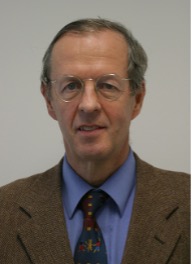
Georg Simbruner, M.D., Professor of Pediatrics and Neonatology, Emeritus University Innbruck, Austria, Ph.D. Theology.
Born 1945 in Upper Austria, studied medicine at Vienna University. In 1993 Georg Simbruner was appointed professor of paediatrics/neonatology at the Ludwig Maximilians University in Munich and in 2002 at the clinic for neonatology at the Medical University of Innsbruck.
From July 2006 Simbruner was managing director of the University Children’s Hospital in Innsbruck.
Guest professorships at Johns Hopkins University, Baltimore and Harvard Med School, Boston, USA, at University of Stellenbosch, South Africa, at Jiao-tong University, Shanghai, China and at King Abdul-Aziz University in Riyadh, Saudi Arabia. Honorary Professor University of Belgrade, Serbia [since May 2007] and
Honorary Professor Zhengzhou University, Zhengzhou, Henan, China.
Recipient « 2010 Neonatal Education Award » of the American Academy of Pediatrics (first European to receive this award)
Research areas were pulmonary mechanics and mechanical ventilation of newborns and hypothermia management for asphyxic newborns with hypoxic-ischemic encephalopathy. Simbruner was the project manager of the large European multi-center study « neo.nEURO.network RCT » on « Systemic Hypothermia after Neonatal Encephalopathy »[2]. Georg Simbruner is also the founder and chairman of IPIOKRaTES, an international foundation for postgraduate education of physicians, as well as the founder and the first president of the Union of European Neonatal and Perinatal Societies UENPS (Union of European Neonatal and Perinatal Societies) which is a roof organisation comprising 31 national neonatal or perinatal societies.
After retiring from the Medical University of Innsbruck in March 2009, Georg Simbruner began studying Catholic theology at the University of Innsbruck and Vienna. Since 2012 he continued his studies in the doctoral program Advanced Theological Studies/Religious Education (dissertation area Catholic theology) and completed his studies with a PhD in Theology, University of Vienna on June 29, 2016 and publised his thesis « The beginning of human existence. Biological-medical contributions to a philosophical-theological anthropology of the prenatal, peri- and immediate postnatal period ». His focus is on anthropological topics, reproductive medicine and epigenetics. Georg Simbruner is the initiator of the lecture series « Religions in the Hospital » running since January 2014 with audio documentation, and is the organizer of three Philosophical-theological Internet Courses on the following topics: 1.) Core topics of philosophy and theology [2020], 2.) Important women in theology and philosophy [2021 ], 3.) Recognition, knowledge and belief and sexuality and religions [2023]. The doctoral thesis « The beginning of human existence and the foundation of man » has been published in German, English, French and Spanish by SVH Verlag and is available at Amazon or morebooks.de or bookstores. Georg Simbruner is married to a South African, the father of six children and grandfather of fifteen grandchildren and lives as a enthusiastic European in Vienna.
18:20
AIRG: A non for profit association for patients and family suffering of genetic kidney diseases
Stéphanie Sénéchal (AIRG Association of Information on Renal Genetic diseases-Suisse)

Chairwoman Patients’ organization AIRG -CH
Senior quality manager
- 1998 Msc in Biochemistry. Faculty of Sciences University of Tours France
- 1999-2000 Technician Fresenius Kabi Limoges-pareneteral nutrition
- 2004 Msc in Pharmacotechnology. Faculty of Pharmacy, University of Tours
- 2000-2007 3M Santé Pithiviers
- 2007-on going. NNE/PHARMAPLAN. Quality manager
- 2010-ongoing NNE/PHARMAPLAN Branch manager
- 2008 ISO 9001 Certification Auditor (AFNOR Paris)
18:30
Remise du prix de l’AIRG en l’honneur de Jean-Pierre Guignard
Dr Simeon Schietzel, Senior physician, Department of Nephrology and Hypertension, University Hospital Bern
Malnutrition, sarcopenia and frailty in autosomal-dominant polycystic kidney disease – Are we underestimating disease-related, negative health-trajectories?
18:45
Special music event: Alexandre Cellier, improvisations
Alexandre Cellier, musician, composer and performer
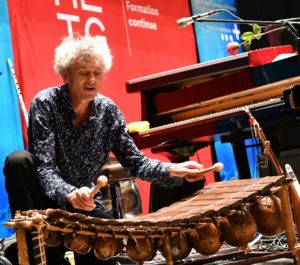 |
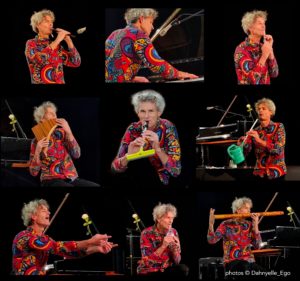 |
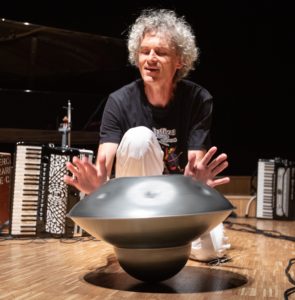 |
Musician, composer and performer, Alexandre Cellier is passionate about musical encounters. His multiple travels and collaborations have continued to enrich his harmonies and his groove. Unexpectedly, the pianist-multi-instrumentalist has a habit: transforming everyday objects into musical instruments, thus creating around him a playful, poetic universe tinged with jazz and Latin music. On stage Alexandre gives everything, constantly reinventing himself and sharing his soul as an amazed child, taking the spectator into unknown territories.
https://www.alexcellier.com/
